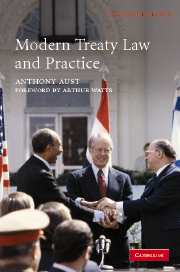Book contents
- Frontmatter
- Contents
- Foreword to the first edition by Sir Arthur Watts
- Preface to the second edition
- Articles of the Convention cited in the text
- Table of treaties
- Table of MOUs
- Table of cases
- Glossary of legal terms
- List of abbreviations
- Introduction
- 1 Vienna Convention on the Law of Treaties 1969
- 2 What is a treaty?
- 3 MOUs
- 4 Capacity to conclude treaties
- 5 Full powers
- 6 Adoption and authentication
- 7 Consent to be bound
- 8 Reservations
- 9 Entry into force
- 10 Treaties and domestic law
- 11 Territorial application
- 12 Successive treaties
- 13 Interpretation
- 14 Third states
- 15 Amendment
- 16 Duration and termination
- 17 Invalidity
- 18 The depositary
- 19 Registration and publication
- 20 Dispute settlement and remedies
- 21 Succession to treaties
- 22 International Organisations
- 23 Drafting and final clauses
- Appendices
- Index
20 - Dispute settlement and remedies
- Frontmatter
- Contents
- Foreword to the first edition by Sir Arthur Watts
- Preface to the second edition
- Articles of the Convention cited in the text
- Table of treaties
- Table of MOUs
- Table of cases
- Glossary of legal terms
- List of abbreviations
- Introduction
- 1 Vienna Convention on the Law of Treaties 1969
- 2 What is a treaty?
- 3 MOUs
- 4 Capacity to conclude treaties
- 5 Full powers
- 6 Adoption and authentication
- 7 Consent to be bound
- 8 Reservations
- 9 Entry into force
- 10 Treaties and domestic law
- 11 Territorial application
- 12 Successive treaties
- 13 Interpretation
- 14 Third states
- 15 Amendment
- 16 Duration and termination
- 17 Invalidity
- 18 The depositary
- 19 Registration and publication
- 20 Dispute settlement and remedies
- 21 Succession to treaties
- 22 International Organisations
- 23 Drafting and final clauses
- Appendices
- Index
Summary
war settles nothing … to win a war is as disastrous as to lose one!
So shrewdly wrote Agatha Christie, who knew about life. This chapter replaces Chapters 20 and 21 of the first edition. They dealt with the settlement of disputes and remedies. Neither subjects are specific to treaties, and have been dealt with more comprehensively in many other books. This merged and shortened chapter therefore concentrates on those matters which are particularly relevant to treaties.
Treaties give rise to numerous disputes about their interpretation or application; in fact most disputes between states, and especially those which are referred to international adjudication, involve, mainly or partly, the interpretation or application of a treaty. Many treaties prescribe how disputes about them may be settled, and this will be the principal focus of this chapter. There is no one prescribed method, nor even one generally used. The methods specified in a multilateral treaty are essentially the same as in a bilateral treaty, since the dispute is usually between only two of the parties. Of course the parties in dispute can always agree to use a method of their own choosing; they are not bound to use that provided by the treaty. But there are many treaty disputes which are never settled, even when a method is laid down in the treaty.
Voluntary settlement
Negotiations and consultations
When a treaty prescribes how disputes can be settled, it usually provides for a preliminary phase where the parties seek to settle the dispute by direct negotiations or consultations.
- Type
- Chapter
- Information
- Modern Treaty Law and Practice , pp. 352 - 366Publisher: Cambridge University PressPrint publication year: 2007



